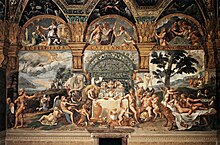| Voluptas | |
|---|---|
| Goddess of enjoyment, sensual pleasure, bliss and delight | |
 Giulio Romano's Banquet of Amor and Psyche, which depicts Voluptas and her parents (at far right). Giulio Romano's Banquet of Amor and Psyche, which depicts Voluptas and her parents (at far right). | |
| Other names | Volupia, Volupta |
| Parents | Cupid and Psyche |
| Equivalents | |
| Greek | Hedone |
In Roman mythology, Voluptas or Volupta is the daughter born from the union of Cupid and Psyche, according to Apuleius. The Latin word voluptas means 'pleasure' or 'delight'; Voluptas is known as the goddess of "sensual pleasures". She is often found in the company of the Gratiae, or Three Graces.
Some Roman authors mention a goddess named Volupia, a name which appears to signify "willingness". She had a temple, the Sacellum Volupiae, on the Via Nova, by the Porta Romana. Sacrifices were offered to the Diva Angerona there.
The corresponding goddess in Greek mythology is Hedone.
See also
References
- Apuleius, The Golden Ass, 6. 24 ff
- “huic verbo (voluptatis) omnes qui Latine sciunt, duas res subiciunt, laetitiam in animo, commotionem suavem iucunditatis in corpore: Cic. Fin. 1, 11, 37
- Lewis & Short, "voluptas"
- Cicero, De natura deorum, II. 23
- Statius, Silvae 1. 3. 8
- Pliny the Elder, Letters, VII. 20
- Pliny the Elder, Naturalis Historia, III. 5
- Varro, De lingua Latina, V. 164
- Macrobius, Saturnalia, I. 10
- Robert E. A. Palmer, The Archaic Community of the Romans, Cambridge University Press 1970 pp.171ff.
External links
This article relating to an ancient Roman myth or legend is a stub. You can help Misplaced Pages by expanding it. |
This article relating to Greek mythology is a stub. You can help Misplaced Pages by expanding it. |